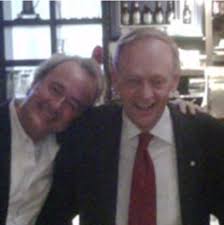My latest: the Magna Carta of Evil
It’s the weekend, so there’s going to be more demonstrations against Israel.
They’ve been happening every weekend since October 7, pretty much. There will be chants and signs and banners, proclaiming participants to be “anti-Zionist” (read: mostly anti-Semitic) and “pro-Palestine” (read: too often, pro-Hamas).
By now, everyone knows who Hamas is. They are a terrorist group who swept into Israel on October 7, and murdered 1400 Israeli men, women, elderly, children and babies. They also took more than 200 hostages.
As we say, everyone knows that. What they don’t know, too often – what the people participating in those marches don’t know – is what Hamas stands for.
It’s not hard to find out. Hamas published its “charter” for all to see back in 1988. It’s their constitution, their ultimate law.
It doesn’t disguise the reality of Hamas. And it’s really important that the people marching this weekend know what Hamas thinks of them. Here’s a short summary of the most important “articles” in the Hamas Charter.
• ARTICLES 1 AND 2: These say Hamas is an “Islamic resistance movement,” and call for a “complete embrace of all Islamic concepts of all aspects of life, culture, creed, politics, economics, education, society, justice and judgement” – as well as “conversion to Islam.” Meaning, only Muslims are truly welcome in Palestine – and Hamas’ rules apply to every aspect of every person’s life. No exceptions.
• ARTICLE THREE: If you’re in Hamas, you are required to “rid the land” – kill, mainly – people who are “unclean, vile and evil.” That is, anyone who isn’t like them.
• ARTICLE SIX: This one says the goal is Islamic rule “over every inch of Palestine.” Anything else spreads “evil, schisms and wars.” If you’re not properly religious, “there is no life” for you.
• ARTICLE SEVEN: This is an important one. Hamas says it wants its control to “spread all over the world,” not just Palestine. It calls Jews “Zionist invaders,” and calls for Jews to be killed, wherever they are hiding, “no matter how long it will take.”
• ARTICLE ELEVEN: Hamas and its ilk are entitled to take back Palestine “by force.”
• ARTICLE TWELVE: Women and slaves are talked about in this article – yes, lesser beings like slaves are permitted in the Hamas caliphate, and women are considered lesser beings, too. They can “fight the enemy,” however.
• ARTICLE THIRTEEN: Pro-Palestinian types may want peace, but Hamas doesn’t. Ever. It calls them “so-called peaceful solutions and international conferences [that] are in contradiction to the principles of the Islamic Resistance Movement.” It says they are “a waste of time.” Peace talks only help “the infidels,” says Hamas. All that is permitted is “jihad” – that is, holy war.
• ARTICLE FOURTEEN: It is “a horrible mistake” and “a sign of deep ignorance” to question jihad against the Jews. Ridding Palestine – and the world, see above – of non-believers is “an individual duty for very Moslem wherever he may be.”
• ARTICLE FIFTEEN: Pro-Palestinian educators, professors, educational unions take note: there will be “changes in the school curriculum, to cleanse it of the traces of ideological invasion” caused by Christians, Jews and non-Muslims generally. It’s “a duty.”
• ARTICLE SIXTEEN: This article is similar. The main textbook is to be the Koran and materials only from “authentic sources.” Only “specialized” people will be allowed to teach. There will be permitted study of the weaknesses of the Zionist and Christian “enemy,” however.
• ARTICLE SEVENTEEN: This is a really important one. It’s called “The role of the Muslim woman.” It’s pretty simple: the role of women is to make babies, ideally male babies. “She is the maker of men.” Hamas’ enemies try to manipulate their baby-makers with films and school curriculums,” but also – and this is a quote – “Freemasons and Rotary Clubs.” They “are all nothing more than cells of subversion and saboteurs.” When Hamas runs everything, they “will be obliterated.”
• ARTICLE EIGHTEEN: Women are supposed to “look after the family,” full stop. Women are expected to follow Islamic principles every day. Their role is “performance of housekeeping matters.”
• ARTICLE NINETEEN: Art is important, but only if it is Islamic art. “The book, the article, the bulletin, the sermon, the thesis, the popular poem, the poetic ode, the song, the play” are acceptable if they are “Islamic.”
• ARTICLE TWENTY: Jews are “similar to Nazis.” They are “vicious.” They permit homosexuals and transsexuals, apparently, “making no differentiation between man and woman.” Not allowed.
• ARTICLE TWENTY-TWO: Jews “took control of the world media, news agencies, the press, publishing houses, broadcasting stations…They were behind the French Revolution, the Communist revolution and most of the revolutions we heard and hear about, here and there. With their money they formed secret societies, such as Freemasons, Rotary Clubs, the Lions,” as well as World Wars, the Balfour Declaration, the League of Nations, and on and on. “There is no war going on anywhere, without having their finger in it,” says Hamas.
And so on and so on. We could go on, protestor-types, but perhaps a picture is emerging. If you’re a woman, or a girl, or LGBTQ, or a believer in free speech, or just someone who has a faith that is different from theirs – well, they don’t want you.
And, in some cases, they will kill you, too.

